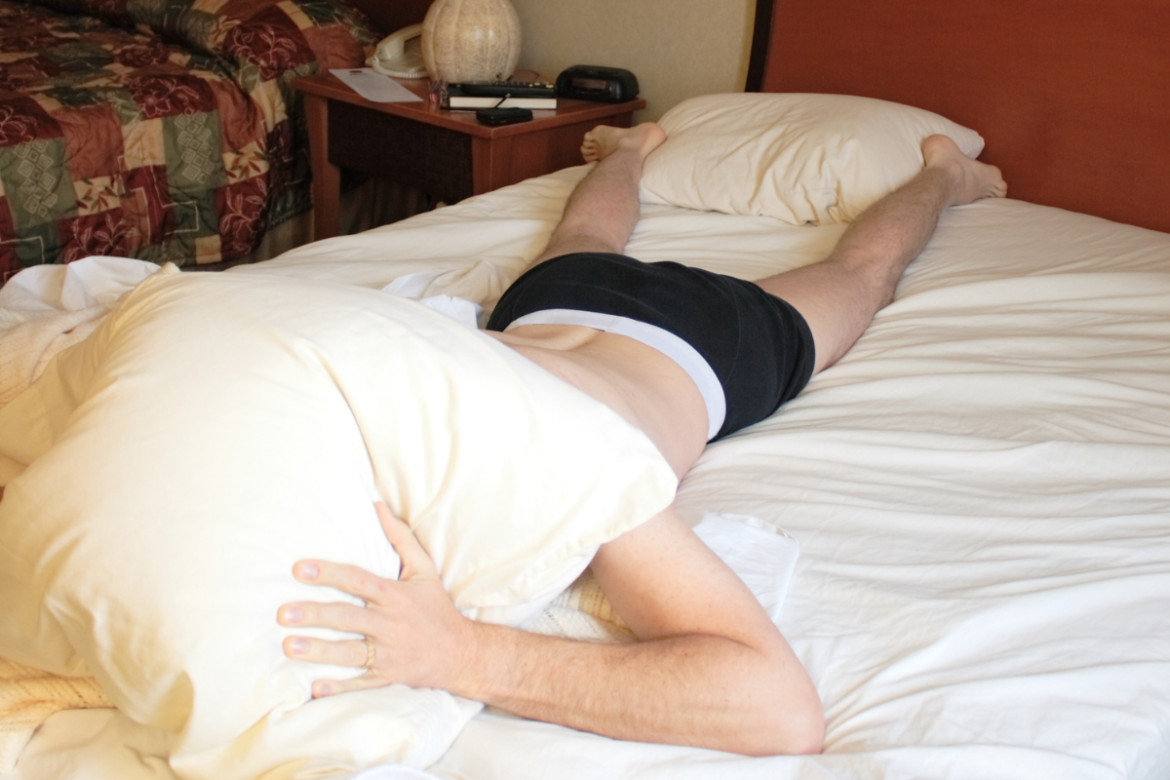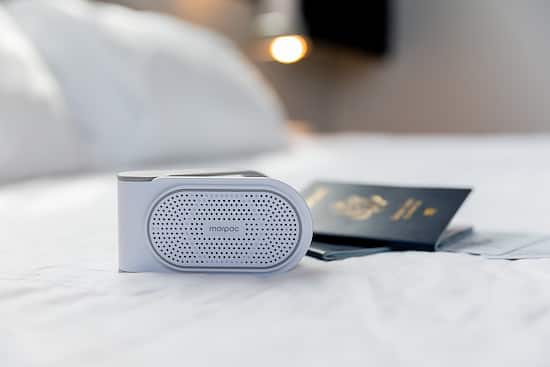Why is it so hard to sleep in a hotel? Is this you: it’s 2 am and you are watching infomercials trying to get to sleep in your hotel? Hotel insomnia is a real thing and it stinks. Here’s how to sleep in a hotel.
As frequent business travelers, we’ve spent our fair share of time in hotel rooms – far more than we care to remember. Over the years we’ve developed a few tried and true techniques to avoid hotel insomnia. Sleeping in a hotel can be a frustrating experience for many – especially the first night. We’ve got your back.
What you will learn:
- The first night in a hotel – why is it hard to get to sleep?
- What is hotel insomnia?
- How jetlag affects your sleep
- How to sleep in a hotel
How to sleep in a hotel and beat hotel insomnia
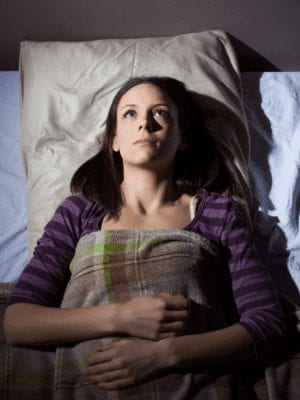
Generally speaking, hotels have invested in providing a quality sleep experience for their guests. Gone are the days of crappy mattresses and ratty pillows. There’s no money in that. Hotels want and need their guests to have a pleasant sleep experience. So they come back and do it again.
Sure, there are still older hotels that haven’t made these investments, or hotels that target a budget-sensitive demographic that do not place as much value on their guest’s sleep experience. But that’s a rarity these days.
Today, nearly all decent hotels provide higher quality mattresses, decent sheets, and a variety of pillow options. The market is too competitive not to.
Why can’t I sleep in a hotel? You are not alone
Some people can sleep anywhere, right? You’ve seen them. They are crammed into an airport nook in the most uncomfortable position and zonked out. Or the moment their heads hit the airplane seat headrest they are soaring the dreamy skies. Some people even love to sleep in hotels. They blissfully drift off to sleep in no time while you are left flipping through channels at two in the morning.
But not everyone.
In fact, for many, sleeping in a hotel can be a very frustrating experience – especially that first night in a hotel.
The first night in a hotel…ugh
The first night in a hotel is often the roughest. This phenomenon is particularly acute when you are in a new time zone – especially when that new time zone is many hours different than your origin – and you are suffering from jet lag.
What is Jet Lag? The Mayo Clinic defines jet lag as “a temporary sleep problem that can affect anyone who quickly travels across multiple time zones.” Learn more about Jet Lag here
Additionally, sleeping in a new bed plays a role here too, not to mention excitement about your trip, both of which can lead to a sleepless first night.
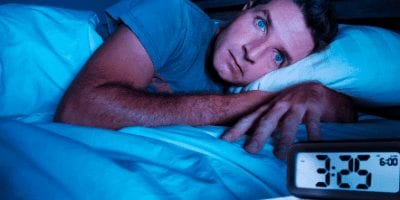
During the first night, your body is adjusting to a new bed, a new pillow, a new time zone, a new climate, and more. Lots of “new information” for your body to process. Savvy business travelers have trained their bodies to deal with this a little better than infrequent travelers, but it can still be a problem for travelers of all types.
As your body adjusts to the new environment your ability to sleep will greatly improve. If you stay at your destination for a lengthy period of time your body will likely fully adjust and any travel-imposed sleeping impediments will be greatly mitigated.
So, why is so hard to sleep in a hotel?
Even after the first night, it can be tough to get a good night’s sleep in a hotel. Jet lag is often the primary reason for this. As noted earlier, as your body acclimates to the new environment sleep will come easier. Stay there long enough, it’s likely you will even be able to get a good night’s sleep.
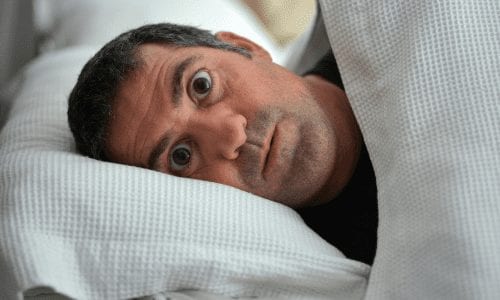
The challenge for travelers is that it’s not uncommon to never stay in a place long enough to fully, truly acclimate before you are on the move (either back home or to your next stop). This is more acute for business travelers who often move from city to city our country to country throughout the course of the week.
According to Statista, the average length of a typical trip was 3 to 4 days (work or pleasure). That’s hardly enough time for your body to fully adjust, leaving your body in a state of sleep limbo.
Put another way, you are stuck watching The First 48 reruns on AMC until 3 am in the morning as you desperately try to catch a few winks.
But, it doesn’t have to be quite so bad.
7 Tips on how to sleep in a hotel and beat hotel insomnia
Peaceful hotel sleep is doable with the right preparation before your trip and the right steps during it. Here are 7 tips on how to sleep in a hotel and beat hotel insomnia. Calibrate these tips based on your unique sleep needs and situation.
- Look before booking
- Do the math (on the time difference, if any) and prepare
- Bring the right stuff
- Hydrate
- Sleep when you are supposed to – or at least try
- A cool, dark room helps
- Take sleep aids if you need to…but follow the doc’s advice
Before your trip
There are a few things travelers can do to prepare a little better before their trip. These range from planning to packing and can help you get yourself ready for the realities of sleeping on the road.
Look before booking
Staying in a hotel next to train tracks or under the flight path at the airport can make for a tough night’s sleep. When you booking your hotel consider it’s physical location. Pull up Google Maps and see what’s around the property. Read the hotel reviews. What are guests saying? No hotel is perfect, and yes it’s a hotel so there will be other people around, but at least do some basic research and make sure you are not setting yourself up for a difficult night.
Do the math
Depending on where and how far you are traveling time zone difference and jet lag could play a huge role in preventing decent sleep. If your trip is in the same time zone or even an hour or so out of your normal zone these effects will be minimized if present at all.
On the other hand, if you are traveling several hours outside of your home time zone (e.g. internationally or even cross coastal) the time difference will play a significant role in your sleep patterns once you arrive.

Conventional wisdom says to try to acclimate yourself to your destination’s time zone as quickly as possible. So, if you are traveling 13 hours and when you arrive it’s 8AM, but in your home time zone it’s bedtime…you need to stay up. Force yourself.
You can ease this a little bit by gently adjusting your sleep schedule before your trip. Get up an hour or so earlier (or stay up a little later) a few days before your trip to help close the gap on the time zone difference.
At the end of the day (pardon the pun), sometimes the differences are too extreme and the jet lag too harsh and you’ve just got to ride it out. But, a little preparation won’t hurt.
Pack the right things to help you sleep
Only you know what it takes to sleep. Maybe it’s earplugs, or the occasional melatonin pill (or something stronger). Maybe it’s your special pillow or your favorite pajamas. Perhaps an eye mask or a white noise machine.
Whatever it is that you rely on to get to sleep, find a travel version of it (if possible) and pack it. For us, we always bring earplugs and NyQuil. Here are a few ideas to consider:
- Travel white noise machine
- Portable travel size blue tooth speaker (so you can listen to your favorite sleep songs)
- Earplugs w/ travel container
- Eye Mask
During your trip
During your trip there are several things travelers can do to ease their sleeping ills. Some of these are obvious, while a few might surprise you.
Hydrate
According to the Oxford Academic, short sleep duration is often related to hydration issues. During your trip, be sure to drink water. Not only will this help with jetlag, but it will also reduce headaches, help you feel fresher, and yes, it will help you fall asleep quicker!
Sleep when you are supposed to – or at least try
It’s important to sleep when you are supposed to. Or at least do your best. We had a saying in the military: “Pee when you can; eat when you can; and sleep when you can.” That meant a lot short small naps in between exercises, or forcing out a few dribbles of urine at the likely last chance you’d have to use the facilities for several hours. That strategy may work for the military, but it’s not always a good idea for restful sleep.
If, when you arrive at your destination, it’s time to go to bed, do so. If it’s time to stay up then stay up. This will be more difficult the first few nights, but it’s important to acclimate your body to your new time zone.
Same goes for being on the plane itself. If it’s night time for your destination WHILE you are on the plane, then sleep on the plane (as best you can). This will make sleeping in a hotel a little easier when you finally get to your lovely room after a long day of travel.
A cool, dark room helps
A cool, dark room will help you sleep better. Crank that AC up, draw the blinds shut, unplug the alarm clock (you aren’t using it anyway), turn your phone over so the light’s not blinking and so on. Get it as dark and cold as you can handle it. You will sleep better.
Oh, and take your socks off. Trust us on this one. It will help you sleep better.
Take sleep aids if you need to…but always follow the doc’s advice
Always be sure to consult a licensed medical professional, but sleep aids may be a necessary part of your hotel sleep experience. Insomnia is not limited to hotel rooms and millions of dollars a year are spent on OTC sleep aids as well as prescription strength sleep meds.
If you need such meds, be sure to bring them with you. Also, it won’t hurt to double check with your doctor on any side effects related to travel. E.g., it is well known that Ambien and airplanes don’t mix.
Popular and safe over the counter options include Melatonin and ZZZQuil. Tylenol PM and NyQuil will also usually do the trick and help with any jet lag headaches you might have. Your doctor can prescribe stronger stuff if you need it. And, as stated earlier, consult a medical professional for specific advice unique to your sleep situation and needs.
Why do I sleep better in a hotel?
If you sleep better in a hotel than you do at home you need to buy a new bed! Maybe some new sheets and fresh pillows, too. You can actually reproduce much of your favorite hotel’s sleep experience at home. Here’s how:
- Hotel Beds you can actually buy
- Top Hotel Pillows for your home
- Where to buy Hotel Sheets
- How to make your bed like a hotel bed (yup, it can be done!)
PS…here’s your top hotel safety tips you’re gonna want to know.
Conclusion
Sleeping in a hotel doesn’t have to be quite so daunting. With time, practice, and the use of the tips and advice we shared here you’ll be sleeping like a baby in no time. Most importantly, use what we’ve shared and then calibrate it with your unique sleep habits and patterns.
Happy traveling out there…and more importantly, happy sleeping!

